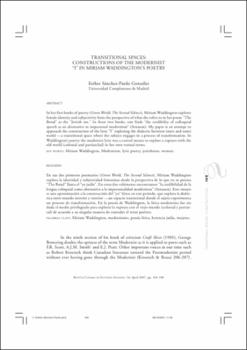Transitional Spaces: Constructions of the Modernist "I" in Miriam Waddington's Poetry
Fecha
2007Resumen
En sus dos primeros poemarios (Green World, The Second Silence), Miriam Waddington explora la identidad y subjetividad femeninas desde la perspectiva de lo que en su poema “The Bond” llama el “yo judío”. En estos dos volúmenes encontramos “la credibilidad de la lengua coloquial como alternativa a la impersonalidad modernista” (Arnason). Este ensayo es una aproximación a la construcción del “yo” lírico en este período, que explora la dialéctica entre mundo interior y exterior —un espacio transicional donde el sujeto experimenta
un proceso de transformación. En la poesía de Waddington, la lírica modernista fue sin duda el medio privilegiado para explorar la ruptura con el viejo mundo (colonial y patriarcal) de acuerdo a su singular manera de entender el texto poético. In her first books of poetry (Green World, The Second Silence), Miriam Waddington explores
female identity and subjectivity from the perspective of what she refers to in her poem “The
Bond” as the “Jewish me.” In these two books, one finds “the credibility of colloquial
speech as an alternative to impersonal modernism” (Arnason). My paper is an attempt to
approach the construction of the lyric “I” exploring the dialectic between inner and outer
world —a transitional space where the subject engages in a process of transformation. In
Waddington’s poetry the modernist lyric was a central means to explore a rupture with the
old world (colonial and patriarchal) in her own textual terms.





